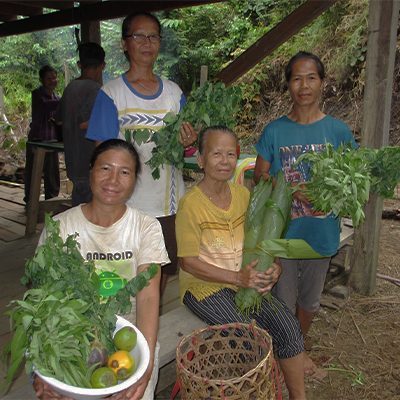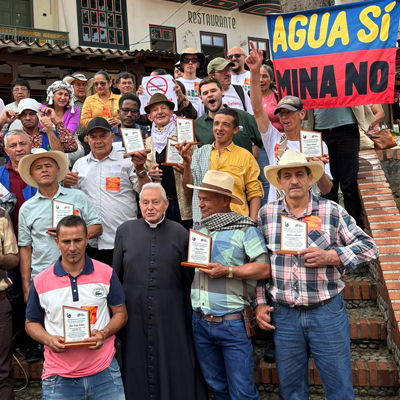Monoculture plantations destroying forests and communities across East Asia
Shamila Araffin from SAM/Friends of the Earth Malaysia speaks to Real World Radio about the destructive nature of agrocommodities
 Chemical-free vegetables and plants grown and harvested by women in Kampung Long Miri, Sarawak. Photo: SAM/Friends of the Earth Malaysia.
Chemical-free vegetables and plants grown and harvested by women in Kampung Long Miri, Sarawak. Photo: SAM/Friends of the Earth Malaysia.
Agrcommodities have been ravaging forests across Malaysia and East Asia for decades. Since the 1990s, monoculture plantations have replaced logging, yet they are no less destructive on the environment or communities.
“You can see the movement of the transnational logging industry first in the Philippines, then after the forest is gone, Thailand and then Malaysia, Indonesia and Papua New Guinea. You can really see the path of destruction of the transnational logging industry and transnational monoculture plantations,” explains Shamila, Senior researcher and media officer SAM/Friends of the Earth Malaysia
In Malaysia this ongoing destruction is caused primarily by plantations for the oil palm and pulp and paper industries. The result is forest loss and the violation of indigenous customary rights and their territories.
Entire forests are lost to corporate interests
Logging, as bad as it was in terms of forest destruction, would often leave some trees standing but, as Shamila highlights, “When you talk about forest conversion [to monoculture plantations] you are talking about total destruction of the entire eco system and it’s irreversible. Such monoculture plantations tend to be developed by corporations.”
Two very different models of agriculture exist: large scale monoculture plantations and small holding farms, as Shamila explains. “They are very different models of agriculture. They are not the same in nature, structure and scale. They represent different economic interests. They seek vastly different grades of profitability. They are situated on different planes of the existing national and global political economic hierarchy.”
The rights of communities, Indigenous Peoples and women
“We lose the forest and communities suffer.”
This conversion of forests to monoculture plantations also impacts indigenous communities whose territories are affected by these plantations. Shamila explains how, “Entire parts of the territories are literarily gone or lost to monoculture plantations.”
When a large scale oil palm plantation is proposed in, for example, Sarawak, Borneo it will not only destroy the forest, it will destroy the livelihoods of indigenous communities and hurt the income of oil palm small holders.
With monoculture plantations, communities lose their land and so they themselves cannot become small holders, which is vital not just for their livelihoods and everyday food, but also income. This extends across their territories as Shamila explains, “A lot of indigenous communities also derive income not only from agriculture but also from the rivers for example. And rivers can be heavily polluted because of monoculture plantations.”
Shamila was clear on the specific impacts to women, whose safety, mobility and ability to secure food and income are greatly reduced. Plantations bring male outsiders to their communities and surrounding areas, leaving women feeling unsafe and uncomfortable with going into the forest or their farms alone.
“Women might go out fishing for the day in groups. But when the ecosystem is affected, crocodile sightings may become more frequent because they don’t have enough food. Now they can’t go out on their own, they have to rely on men to accompany them because they are naturally afraid of the crocodiles. This impacts their ability to bring food and money home. Fishing is lucrative for women, providing their own income from selling the fish.”
Fighting back with sustainable, rights-centred, people led solutions
SAM/Friends of the Earth Malaysia supports communities, Indigenous Peoples and small holders as well as working at the national level highlighting impacts and calling for change.
Shamila explains how they “work with [communities] to help them to protect their territories from encroachment and on the ecological impacts of plantations, for example severe river pollution, or intense flooding. We highlight the impacts, environmental impacts to the authorities. We are looking into working at the policy level to have more sustainable forms of agriculture carried out in the country.”
Community forest management, agroecology and exchanges are the way forward. And rights are central to this work according to Shamila, “Territorial reality is very important for indigenous communities. If you want community rights to be central to forestry management you must recognise their territories. Our community partners would all like to have their territories recognised, intact, as they are.”
Women play a central role in community forest management and agroecology. SAM works on strengthening partners within and between communities. They organise exchanges so “there is vital networking, sharing of knowledge, sharing of seeds and a really meaningful exchange between communities who are very active in these practises.”
This work is very much led by the people who have spearheaded these practices for centuries, as Shamila explains, “Indigenous communities are the proponents of forestry management and agriculture that are sustainable so we only try to strengthen them to defend their territories so their practises can continue.”
Urban communities are also now promoting and practising sustainable agriculture in towns and cities. This movement within urban areas is spreading to nearby cities such as Kuala Lumpur, where communities are gathering to protect the forest around the capital city.
SAM also works at the national level on policy implementation which is currently very weak and flawed. Shamila explains how Malaysia currently lacks “a strong policy to allow communities to meaningfully participate in forestry management.”
“Sam is therefore working on proposals to strengthen these rights in forestry management and to integrate the protection of forests and the protection of community rights. They should go together but currently we do not have strong laws to protect community rights or laws to put community rights at the centre of forestry management or protection.”





